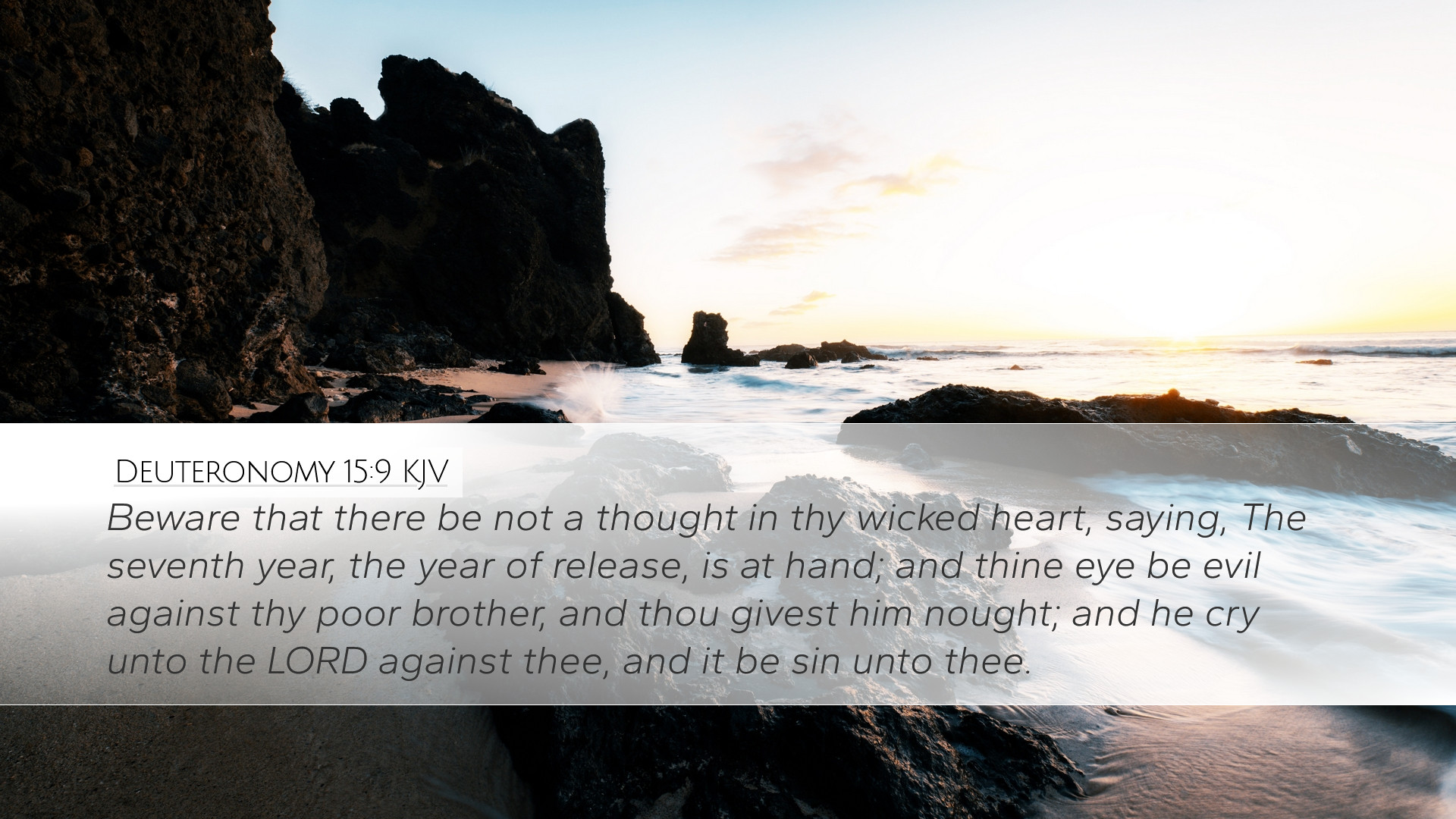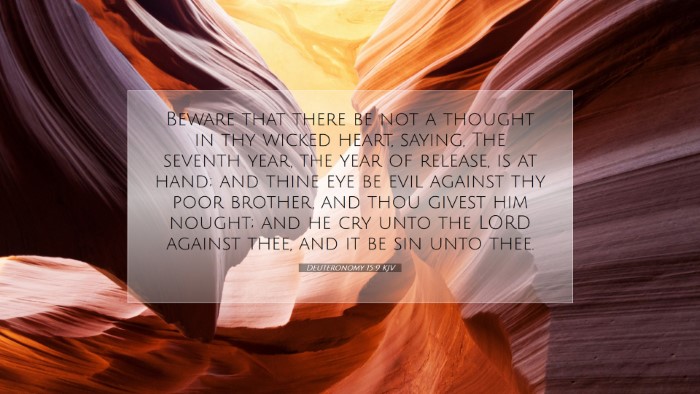Commentary on Deuteronomy 15:9
Deuteronomy 15:9 states: "Beware that there is not a thought in your wicked heart, saying: ‘The seventh year, the year of release, is at hand,’ and your eye be evil against your poor brother, and you give him nothing; and he cry out to the LORD against you, and it become sin among you." This verse encapsulates the theological and ethical imperatives governing the Israelite community during the year of release, emphasizing generosity, compassion, and the moral implications of withholding aid.
Context and Theological Significance
In the context of Deuteronomy, the Israelites are on the verge of entering the Promised Land. Moses, in his farewell addresses, commands them to uphold the laws that will govern their society. This particular injunction serves as a reminder of the importance of social justice and community responsibility.
Matthew Henry's Commentary
Matthew Henry highlights the crucial nature of the warning against selfishness. He notes that the “wicked heart” reflects a mindset that discards the call for mercy in the face of a looming obligation. Henry recounts, “The temporal relief of the poor should not be influenced by the proximity of the Sabbatical year, for God’s laws compel compassion irrespective of personal gain.” This perspective illustrates that the anticipation of the year of release should prompt an increased spirit of generosity rather than reluctance.
Albert Barnes' Insights
Albert Barnes elaborates on the phrase “evil eye” as a metaphor for enmity or ill will towards a neighbor in need. He writes, “Wealth creates responsibility. The thought of the approaching year of release could tempt one to withhold support from the impoverished, fearing loss of personal resources.” Barnes stresses that God’s law counteracts such inclinations by ensuring that mercy and justice prevail over greed. The call here is for an internal transformation leading to external actions that reflect a heart aligned with God's values.
Adam Clarke's Exegesis
Adam Clarke emphasizes the practical implications of the law of release, elaborating on the community dynamics at play. He states that this law serves to promote equity and dissuade oppression among the Israelites. Clarke warns that if the wealthy neglect the needs of the less fortunate, they not only harm their brethren but also incur guilt before God: “This sin can arouse the anger of God, causing their cries to ascend to Him.” Clarke's analysis brings forth the reality that ignoring societal injustices has profound spiritual consequences.
Ethical Considerations
The verse raises significant ethical questions about the responsibilities of those in a position of socio-economic power towards the vulnerable. These implications are timeless, reverberating through both ancient and contemporary contexts.
- Generosity in Anticipation: The anticipation of the year of release should not instill fear or selfishness but rather inspire greater generosity. The potential for loss must be countered by faith in God’s provision.
- Community Health: A community thriving on mutual support breeds respect and strengthens covenant relationships, resulting in a more harmonious society.
- Spiritual Accountability: This text reinforces the idea that believers are accountable to God for their treatment of others, as their sins will elicit divine retribution.
Application for Modern Believers
For pastors, theologians, and students, Deuteronomy 15:9 serves as a reminder to cultivate a heart of compassion. The following applications can be drawn from this passage:
- Reflect on Generosity: Consider personal attitudes towards generosity, especially in times of perceived scarcity. Seek to confront selfish desires through prayer and action.
- Advocate for the Poor: Engage actively in social justice movements that align with biblical teachings, aiming to uplift those who struggle economically.
- Examine Community Structures: Evaluate community practices that may perpetuate inequality, plant seeds of change through advocacy for fair policies.
Conclusion
Deuteronomy 15:9 encapsulates a critical ethical framework. It challenges believers to confront their inclinations toward selfishness while advocating for justice and mercy. The insights gleaned from the commentaries of Matthew Henry, Albert Barnes, and Adam Clarke provide a rich tapestry of understanding that stretches far beyond mere historical context, urging contemporary Christians to integrate these principles into their living faith, embracing a spirit of generosity that reflects the heart of God.


